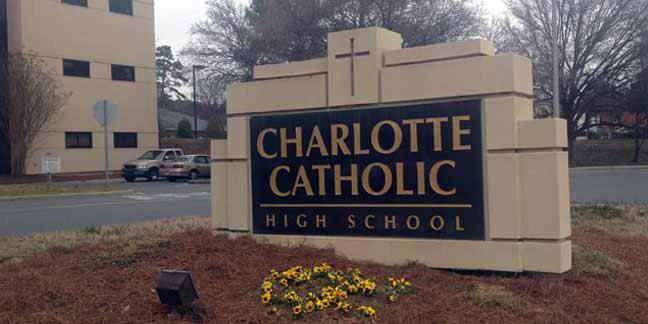 CHARLOTTE — Legal action continues in the case of a former substitute teacher who sued Charlotte Catholic High School, the Mecklenburg Area Catholic Schools system, and the Diocese of Charlotte, claiming his civil rights were violated when the high school decided to stop calling him for substitute teaching work.
CHARLOTTE — Legal action continues in the case of a former substitute teacher who sued Charlotte Catholic High School, the Mecklenburg Area Catholic Schools system, and the Diocese of Charlotte, claiming his civil rights were violated when the high school decided to stop calling him for substitute teaching work.
Lonnie H. Billard, a retired drama teacher at the high school, alleges in a 2017 federal lawsuit that he was removed from the school’s list of substitute teachers in 2014 because he announced his plans on Facebook to marry his male partner – and because “he is a man who intended to – and did – marry another man.”
The diocese argues the employment action was taken not because of Billard’s sexual orientation but because his announcement on Facebook constituted public advocacy against the Catholic Church’s teaching about marriage – violating the terms of his employment. Like all religious schools, the diocese says Catholic schools have the right to employ teachers who will support the Church’s mission, including its doctrine on marriage, and cannot be compelled to employ a teacher who publicly opposes those teachings.
Last week, on Sept. 3, 2021, U.S. District Court Judge Max Cogburn sided with Billard, ruling that the high school, the school system and the diocese violated the prohibition against sex discrimination in Title VII of the Civil Rights Act of 1964.
The judge found that Billard “received a harsher punishment than if he had simply expressed positive views of same-sex marriage as a straight person,” and thus was treated differently because of his sex. He ordered the case be sent to trial to determine appropriate relief for Billard.
The diocese responded that it disagreed with the decision and was considering next steps, which could include an appeal.
“This case is not about sexual orientation or sex discrimination – it’s about Catholic schools having the freedom to employ people who support – or at least won’t publicly oppose – the religious message the schools seek to convey to students,” attorney Josh Davey, whose firm Troutman Pepper is representing the diocese, told the Catholic News Herald.
“Religious schools have the well-established right under the First Amendment, federal law and case law to employ people who will support their religious mission and message,” he said.
Cogburn is the same judge who in 2014 struck down North Carolina’s voter-approved constitutional amendment defining marriage as between one man and one woman.
Billard’s lawsuit was filed Jan. 11, 2017, in the U.S. District Court for the Western District of North Carolina on his behalf by the North Carolina affiliate of the American Civil Liberties Union and the Charlotte-based law firm Tin Fulton Walker & Owen. It contends that Billard was unlawfully discriminated against because of his sexual orientation, his intended same-sex marriage, and “because he does not conform to sex-based stereotypes associated with men in our society.”
In a statement issued the day the lawsuit was filed, Billard’s attorney said the school’s action was discriminatory. “Lonnie was fired because he announced his marriage to his longtime partner, who is a man, and that is sex discrimination, pure and simple,” said Chris Brook, legal director for the ACLU of North Carolina.
In 2020, the U.S. Supreme Court clarified in a 6-3 decision that Title VII’s protections against sex discrimination also applied to sexual orientation and gender identity.
Billard retired after 11 years from a full-time teaching job at Charlotte Catholic High School in 2012. He continued working at the high school as an occasional substitute teacher over the next two years, for a total of about 36 weeks, according to the lawsuit.
In October 2014, Billard announced on Facebook that he and his male partner were planning to get married the next May.
All employees of the diocese agree upon their employment to follow the diocese’s ethics policy and a personnel policy that requires them to conduct themselves in a manner consistent with the teachings of the Catholic Church.
Catholic teaching holds that marriage can only be the union of a man and woman.
The diocese’s attorney said teachers are a critical part of the mission of a Catholic education, which includes the doctrine on marriage. Religious schools, Davey said, have a right to employ people aligned with that mission.
“The First Amendment, federal law, and recent Supreme Court decisions all recognize the rights of religious organizations to make employment decisions based on religious observance and preference,” the diocese said in a statement following the ruling. “They do not – and should not – compel religious schools to employ teachers who publicly contradict their teachings. The Catholic schools offered by the Diocese of Charlotte exist to provide high-quality education and transmit the
Catholic faith to the next generation. Like all religious schools, Catholic schools are permitted to employ educators who support our Church’s teachings and will not publicly oppose them.”
— Catholic News Herald


